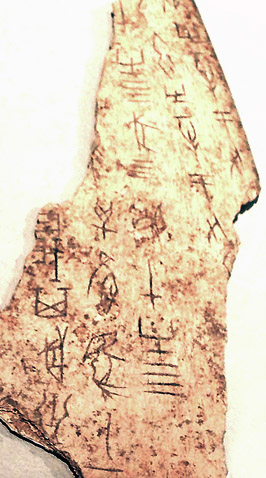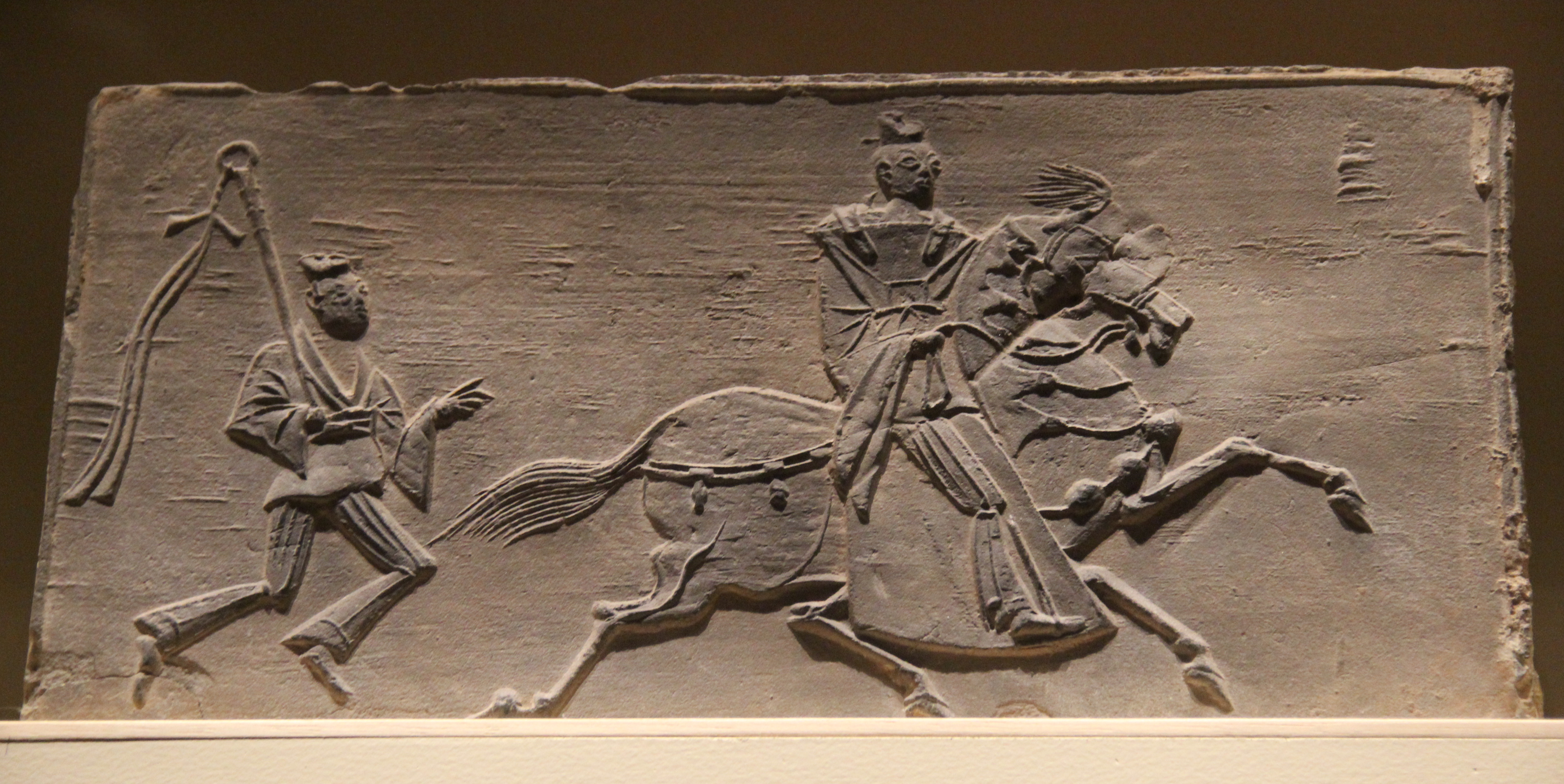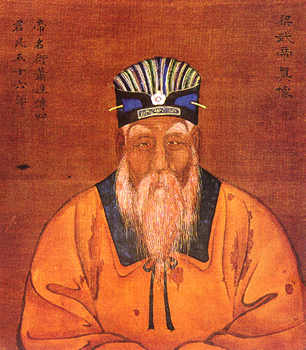|
Fan Yun
Fàn Yun (c. 451–15 June 503According to Xiao Yan's biography in ''Book of Liang'', Fan Yun died on the ''dingsi'' day of the 5th month of the 2nd year of the ''Tianjian'' era of his reign. This corresponds to 15 Jun 503 in the Julian calendar. [(天监二年)五月丁巳,尚书右仆射范云卒。] ''Liang Shu'', vol.02) () was born in Wuyin (舞阴) (in the northwest of today's Biyang County (泌阳县), Zhumadian Prefect, Henan Province) and lived during the Liu Song dynasty, Liu Song, Southern Qi and Liang dynasty, Liang dynasties. He learned to write poems at the age of eight and had a quick wit. He was a personal friend of Emperor Wu of Liang, Emperor Wu, founder of the Liang dynasty, and held authority as Wu's de facto Grand councilor, chancellor, although he died less than two years into Emperor Wu's reign. Fàn was a member of the elite Fan (surname), Fàn family. Life See also *Yongming poetry References 450s births 503 deaths Liang dynasty poets Souther ... [...More Info...] [...Related Items...] OR: [Wikipedia] [Google] [Baidu] |
Zhumadian
Zhumadian ( zh, s= , t= , p=Zhùmǎdiàn; Postal romanization, postal: Chumatien) is a prefecture-level city in southern Henan province of China, province, China. It borders Xinyang to the south, Nanyang, Henan, Nanyang to the west, Pingdingshan to the northwest, Luohe to the north, Zhoukou to the northeast, and the province of Anhui to the east. As of the 2020 Chinese census, its total population was 7,008,427 inhabitants whom 1,466,913 lived in the built-up (or metro) area made of Yicheng District, Zhumadian, Yicheng District and Suiping County now conurbated. It was once the center of the Cai (state), Cai state during the Eastern Zhou era. The state leaves its name in several of the subdivisions including Shangcai County and Xincai County. Administrative divisions The prefecture-level city of Zhumadian administers 1 district of China, district and 9 County (People's Republic of China), counties. *Yicheng District, Zhumadian, Yicheng District () *Runan County () *Pingyu Count ... [...More Info...] [...Related Items...] OR: [Wikipedia] [Google] [Baidu] |
Henan Province
Henan; alternatively Honan is a province in Central China. Henan is home to many heritage sites, including Yinxu, the ruins of the final capital of the Shang dynasty () and the Shaolin Temple. Four of the historical capitals of China, Luoyang, Anyang, Kaifeng and Zhengzhou, are in Henan. While the province's name means 'south of the river', approximately a quarter of the province lies north of the Yellow River. With an area of , Henan covers a large part of the fertile and densely populated North China Plain. Its neighboring provinces are Shaanxi, Shanxi, Hebei, Shandong, Anhui, and Hubei. Henan is China's third-most populous province and the most populous among inland provinces, with a population of over 99 million as of 2020. It is also the world's seventh-most populous administrative division; if it were a country by itself, Henan would be the 17th-most populous in the world, behind Egypt and Vietnam. People from Henan often suffer from regional discrimination. ... [...More Info...] [...Related Items...] OR: [Wikipedia] [Google] [Baidu] |
Liu Song Dynasty
Song, known as Liu Song (), Former Song (前宋) or Song of (the) Southern dynasties (南朝宋) in historiography, was an imperial dynasty of China and the first of the four Southern dynasties during the Northern and Southern dynasties period. It succeeded the Eastern Jin dynasty and preceded the Southern Qi dynasty. The dynasty was founded by Liu Yu (Emperor Wu; 363–422 CE), whose surname together with "Song" forms the common name for the dynasty, the "Liu Song". This appellation is used to distinguish it from a later dynasty of the same name, the Song dynasty (960–1279 CE, ruled by the House of Zhao). Although the Liu Song has also at times been referred to as the "Southern Song", the name is now mainly used to refer to the Song dynasty after 1127 CE. The Liu Song was a time when there was much internal turmoil. A number of emperors were incompetent and/or tyrannical, which at least partially led to many military revolts. These rulers include Liu Shao, Emperor Xi ... [...More Info...] [...Related Items...] OR: [Wikipedia] [Google] [Baidu] |
Southern Qi
Qi, known in historiography as the Southern Qi ( or ) or Xiao Qi (), was a Chinese imperial dynasty and the second of the four Southern dynasties during the Northern and Southern dynasties era. It followed the Liu Song dynasty and was succeeded by the Liang dynasty. The main polity to its north was the Northern Wei. History The dynasty began in 479, when Xiao Daocheng forced the Emperor Shun of Liu Song (宋顺帝) into yielding the throne to him, ending Liu Song and starting Southern Qi, as its Emperor Gao. The dynasty's name was taken from Xiao's fief, which roughly occupied the same territory as the Warring States era Kingdom of Qi. The Book of the Qi does not mention whether or not Xiao had any blood relationship to either the House of Jiang or House of Tian, the two dynasties which had previously ruled that kingdom. During its 23-year history, the dynasty was largely filled with instability, as after the death of the capable Emperor Gao and Emperor Wu, Empe ... [...More Info...] [...Related Items...] OR: [Wikipedia] [Google] [Baidu] |
Liang Dynasty
The Liang dynasty (), alternatively known as the Southern Liang () or Xiao Liang () in historiography, was an imperial dynasty of China and the third of the four Southern dynasties during the Northern and Southern dynasties period. It was preceded by the Southern Qi dynasty and succeeded by the Chen dynasty. The rump state of Western Liang existed until it was conquered in 587 by the Sui dynasty. Rule During the Liang dynasty, in 547 a Persian embassy paid tribute to the Liang, amber was recorded as originating from Persia by the '' Book of Liang''. In 548, the Prince of Henan Hou Jing started a rebellion with Xiao Zhengde, the Prince of Linhe, nephew and a former heir of the Emperor Wu of Liang, and installed Xiao Zhengde as emperor. In 549, Hou sacked Jiankang, deposed and killed Xiao Zhengde, seized power and put Emperor Wu effectively under house arrest. He dismissed the armies opposed to him in the name of Emperor Wu. In 549, Emperor Wu died; Emperor Wu's third ... [...More Info...] [...Related Items...] OR: [Wikipedia] [Google] [Baidu] |
Emperor Wu Of Liang
Emperor Wu of Liang () (464 – 12 June 549), personal name Xiao Yan (蕭衍), courtesy name Shuda (叔達), childhood name Lian'er (練兒), was the founding Emperor of China, emperor of the Chinese Liang dynasty, during the Northern and Southern dynasties period. His reign, until its end, was one of the most stable and prosperous among the Southern dynasties. He came from the same Xiao clan of Lanling (蘭陵蕭氏) that ruled the preceding Southern Qi, Southern Qi dynasty, but from a different branch. Emperor Wu established universities and extended the Confucian civil service exams, demanding that sons of nobles (士族) study. He was well read himself and wrote poetry and patronized the arts. Although for governmental affairs he was Confucian in values, he embraced Buddhism as well. He himself was attracted to many Indian traditions. He banned the sacrifice of animals and was against execution (legal), execution. It was said that he received the Buddhist precepts during his r ... [...More Info...] [...Related Items...] OR: [Wikipedia] [Google] [Baidu] |
Grand Councilor
The grand chancellor (, among other titles), also translated as counselor-in-chief, chancellor, chief councillor, chief minister, imperial chancellor, lieutenant chancellor and prime minister, was the highest-ranking executive official in the imperial Chinese government. The term was known by many different names throughout Chinese history, and the exact extent of the powers associated with the position fluctuated greatly, even during a particular dynasty. Professor Zhu Zongbin of Peking University outlined the role of "grand chancellor" as one with the power to oversee all jurisdictional matters, the right to decide and to draft edicts with other ministers, and the position of chief advisor to the emperor. This extended even to the ability to criticize the emperor's edicts and decisions. Thus, the grand chancellor served as the emperor's chief of staff and main political advisor, often exercising power second only to the emperor. In practice, the grand chancellor was often a t ... [...More Info...] [...Related Items...] OR: [Wikipedia] [Google] [Baidu] |
Fan (surname)
Fàn () is a Chinese family name. It is also one of the most common surnames in Vietnam, where it is written as Pham (范 - Phạm), and occurs in Korea as Beom (范, 범). It is the 46th name on the ''Hundred Family Surnames'' poem in Chinese. Fàn (范) History The House of Fàn (Fàn Family or Fàn Clan) is a Chinese noble family that traces its origins to the model Emperor Yao, a legendary Chinese ruler who lived from 2358 – 2258 BCE. Emperor Yao is a 5th generation descendant of Emperor Huang (or Yellow Emperor), and the second son of Emperor Ku. Until the Zhou dynasty (1122–256 BCE), the Fàns are associated with the Du Clan. It is said that Duke of Tangdu (Du Bo), a direct descendant of Emperor Yao, was murdered by the penultimate king of the Western Zhou dynasty, King Xuan (周宣王, 827–781 BCE). The Duke's son, Xian Shu (隰叔, also called Du Xian or "Uncle Xian") fled to the state of Jin (present day Shanxi Province) and was eventually appointed Min ... [...More Info...] [...Related Items...] OR: [Wikipedia] [Google] [Baidu] |
Yongming Poetry
Yongming poetry refers to a poetry style of the Chinese Southern Qi dynasty in the 5th century AD. Yongming () was an era name of the Emperor Wu of Southern Qi. The Yongming period was from 483 to 493. However brief this era, it is now associated with a major movement within Classical Chinese poetry. Background Despite the disturbances and instability which preceded and followed the Yongming era, there was also something special about it. In his ''Zizhi Tongjian'', Song dynasty historian Sima Guang characterized the Emperor Wu and his Yongming era, saying that: This was also an era that came to be associated with significant poetic achievements. Poets *Shen Yue (441–513) was the most important of poet of the Yongming era, developing rules of tonal euphony that would eventually evolve into the regulated verse format of "recent style" poetry. *Xie Tiao (464–499) was another well-known poet of the Yongming, known for his vivid descriptions of landscapes. * Wang Rong (468 - 49 ... [...More Info...] [...Related Items...] OR: [Wikipedia] [Google] [Baidu] |
450s Births
45 may refer to: * 45 (number) * one of the years 45 BC, AD 45, 1945, 2045 Film * ''45'' (2009 film), directed by Peter Coster *45 (upcoming film), an upcoming Kannada-language action fantasy film * ''.45'' (film), directed by Gary Lennon (2006) Music * ''45'' (Jaguares album), 2008 * ''45'' (Kino album), 1982 * "45" (Bon Iver song), 2016 * "45" (The Gaslight Anthem song), 2012 * "45" (Shinedown song), 2003 * "45" (Elvis Costello song), 2002 *The group Stars on 45 and its self-titled 1981 song, "Stars on 45" *"Forty Five", a song by Karma to Burn from the album ''Appalachian Incantation'', 2010 *45 rpm record or 45, a common form of vinyl single In science *The atomic number of rhodium Astronomy *Messier object M45, a magnitude 1.4 open cluster in the constellation Taurus, also known as the Pleiades *The New General Catalogue object NGC 45, a magnitude 10.6 spiral galaxy in the constellation Cetus Other uses *Donald Trump, the 45th and 47th President of the United States, wit ... [...More Info...] [...Related Items...] OR: [Wikipedia] [Google] [Baidu] |
503 Deaths
__NOTOC__ Year 503 ( DIII) was a common year starting on Wednesday of the Julian calendar. At the time, it was known as the Year of the Consulship of Volusianus and Dexicrates (or, less frequently, year 1256 ''Ab urbe condita''). The denomination 503 for this year has been used since the early medieval period, when the Anno Domini calendar era became the prevalent method in Europe for naming years. Events Byzantine Empire * War with Sassanid Persia: Emperor Anastasius I sends a Byzantine army (52,000 men) to Armenia, but is defeated. The Romans attempt an unsuccessful siege of the Persian-held city Amida, on the Tigris. King Kavadh I invades Osroene, and lays siege to the city of Edessa (Northern Mesopotamia). * May – Areobindus, Byzantine general (''magister militum''), is stationed as commander at Dara, with an army of 12,000 men to keep watch at the Persian stronghold of Nisibis (modern Turkey). Palestine * Mundhir III, king of the Lakhmids (Arab Christia ... [...More Info...] [...Related Items...] OR: [Wikipedia] [Google] [Baidu] |
Liang Dynasty Poets
Liang may refer to: Chinese history * Liang (state) (梁) (8th century BC – 641 BC), a Spring and Autumn period state * Wei (state) (403–225 BC), a Warring States period state, also known as Liang (梁) after moving its capital to Daliang ** Kaifeng, a city formerly known as Daliang (大梁) ** Liang (realm) (梁), a fief held by various princes under imperial China * Liang (Han dynasty kingdom) (梁), a kingdom/principality in the Han dynasty * Liang Province (涼州), an administrative division in ancient China covering present-day Gansu, Ningxia, and parts of Qinghai, Xinjiang, and Inner Mongolia * Former Liang (涼) (320–376), one of the Sixteen Kingdoms * Later Liang (Sixteen Kingdoms) (涼) (386–403), one of the Sixteen Kingdoms * Southern Liang (Sixteen Kingdoms) (涼) (397–414), one of the Sixteen Kingdoms * Northern Liang (涼) (397–439), one of the Sixteen Kingdoms * Western Liang (Sixteen Kingdoms) (涼) (400–421), one of the Sixteen Kingdoms * Liang dyn ... [...More Info...] [...Related Items...] OR: [Wikipedia] [Google] [Baidu] |




